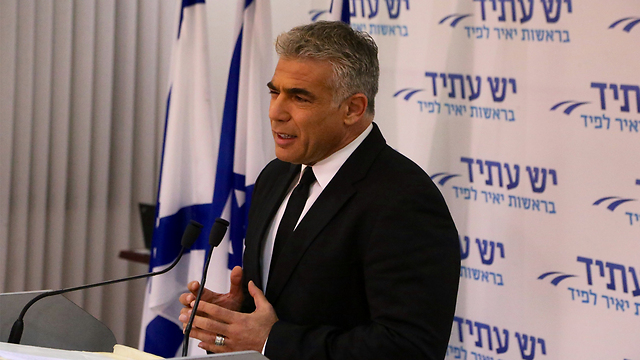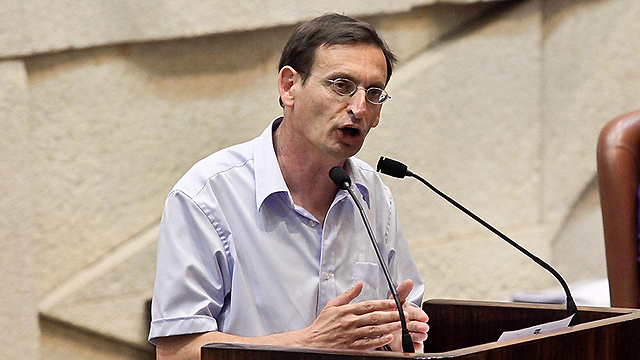
This election will be a race to 20 Knesset seats
Analysis: Convinced that only one party can reach magic number required to form next government, both Lapid and Herzog are wooing Livni; meanwhile, Lieberman is making a play for center and Dov Khenin is preparing to take his leave of Knesset.
In the hall for press conferences at Tel Aviv's Beit Sokolov (the home of Israeli journalism) – the sets were assembled in double quick time: folding backdrops of canvas and wood, with the words "Yesh Atid under the leadership of Yair Lapid" repeated across them, and two teleprompters - from which Yair Lapid read his prepared text.
The teleprompters do not show up on television. They are placed at both sides of the speaker to allow Lapid to face the voters, address to them from the heart.
"You are out of touch," Lapid says as he repeatedly slams Netanyahu. "You are out of touch," he says – slowly – at the start of each paragraph, emphasizing each syllable. It was obvious that someone would remix this speech; it's a speech designed, if not to be put to music, then to be given an autotune makeover and rendered within a matter of hours for viewing on YouTube. And why not? It's a catchy phrase, with a clear insult. But is being out of touch Benjamin Netanyahu's greatest sin? I'm not convinced.
"You live in an aquarium," Lapid accused. The truth is that the prime minister of Israel does live in an aquarium. The longer he spends in office, the more the glass walls of his aquarium become murky, impenetrable. Once upon a time, you could see the demonstrators outside the windows of the prime minister's office. But Yitzhak Rabin's assassination sealed shut the windows both in the prime minister's office and in his residence. The prime minister lives in a sterile bubble.
When he does leave the house, the bubble goes with him. Dark tinted car windows prevent him from seeing the view. He only breathes conditioned air in summer and winter, and only sweats under the spotlights. The state is the bubble is him.
The same entourage surrounds him wherever he goes – the same guards, aides and helpers, who smother him in flattery and record him in secret, waiting for judgment day. He convenes a cabinet meeting and sees only enemies plotting to succeed him and extortionists who want to rob him of his power. There is no one in the political system with whom he can share his woes: Everyone is against him.
Disconnect is his default state; it is extremely difficult to avoid and very easy to drown in.
When the disconnect between President Obama and the US Congress reached a level of national crisis, the media asked for the opinions of experts in American history. Doris Kearns Goodwin, who has written fascinating biographies of Lyndon Johnson, Roosevelt and Lincoln, advised Obama to invite his colleagues into the family wing of the White House.
Eat with them, drink with them, watch sports with them on TV, she said. This is how past presidents have passed controversial reforms, with the political system unified behind them. Obama did not heed the advice. And like Netanyahu, Obama was punished. It happened to the president after six years, to Netanyahu after nine.
Over the years, suspicion breeds alienation, paranoia and suspicion. When Lapid set out several days ago for his private meeting with Netanyahu, which preempted his dismissal, he told his sister, a psychologist by profession, that Netanyahu was more her field, not his. Tzipi Livni spoke openly about paranoia.
Netanyahu explained the dismissal of two by citing a conspiracy concocted by the current Knesset to establish an alternative government, behind his back. Indeed, there was such an initiative, childish and desperate, but Livni was not involved. The monstrous descriptions by Netanyahu at his press conference Tuesday had little to do with reality, and any attempt to interpret them inevitably leads down clinical paths.
But now, at the start of the election campaign, Netanyahu's problem is not what his rivals are saying, but what his own people think of him. And the Likud members smell defeat.
A Labor Movement
The magic number in this election is 20. Netanyahu, Lapid and Labor leader Isaac Herzog all believe that whoever wins 20 or more seats will form the future government. The calculations are simple – there are two blocs, the right-wing plus the ultra-Orthodox bloc and "just-not-Bibi" bloc. But this time the spread among the different parties is so great that only one could feasibly get more than 20 seats, and the respective blocs would have to rally behind whoever reaches the magic number. Election night will be all about the race to 20.
The elections war will be waged, therefore, on two fronts. The primary battle, obviously, is between the blocs. The right will attack the center-left; the center will attack the right. This more complex and fascinating fight is within each bloc. Netanyahu attacks Lapid in the hopes of convincing the right-wing voters, who are debating between Bayit Yehudi leader Naftali Bennett and Yisrael Beiteinu chief Avigdor Lieberman or considering staying at home, that despite everything, they have to vote Likud. In this context, Lapid is not the enemy - it is leverage against ceding voters to Bennett.
Netanyahu faces two dangers. Firstly, that the center and the left will unite as one bloc; secondly, that Bayit Yehudi will draw with Likud in the polls. Such a situation would legally require Bennett and Netanyahu to rotate the position of prime minister.
The opposing bloc is virtually a mirror image. Herzog and Lapid are fighting for supremacy in the war against Netanyahu. When they attack the right, they have one eye on the undecided voters, who are vacillating between Labor and Lapid, between Meretz and former Likud minister Moshe Kahlon, who is building on his popularity while keeping his options open.
Tzipi Livni is a key figure in this fight. After six difficult years, first as leader of the opposition and then as head of a small faction in Netanyahu's coalition, she is looking for some tender treatment. Both Herzog and Lapid are courting her. According to three surveys that landed on the desk of the Labor chairman this week, Livni could bring Labor another two or three seats. Such an addition could propel Labor beyond the magic number of 20 seats - and make Herzog leader of the bloc. One survey even put the number at 21.
The same surveys say that Livni would not add votes for Lapid, but her addition would prevent Labor from getting stronger. Given the competition within the bloc, she is critical, and therefore Lapid is wooing her too.
Herzog is offering Livni an agreement akin to the previous pact between Lieberman and Likud: One list at the polls, a joint faction in the Knesset, but separate platforms. Livni and former minister Amir Peretz will make the top ten, while others would get places at a later date. The negotiations are not over, but probably will be, either way, this weekend, when the party leaders gather for the Saban Forum in Washington DC.
Lapid's advantage is his freedom to maneuver - he could strike an agreement with Livni over a cup of coffee. But this could also be drawback, for he heads a party that only has room for one leader.
Within the Labor Party there will be some opposition, but both Herzog and Eitan Cabel have reassured Livni that she has nothing to fear – they have a massive majority at the party conference. The way it looks at present, Livni would have no difficulty in joining either Labor of Yesh Atid. Opting for Labor could pose a problem, however, given her political upbringing. Ceding parts of the homeland is one thing, but an alliance with the historic Mapai – what would her late parents, both Irgun activists, say?
For now, relations within the Herzog-Livni-Lapid triumvirate are good. Having Netanyahu as a common enemy unites them. But the moment the candidate lists are formed, the competition will begin. Lapid is going into the campaign season with 11,000 activists on the ground, well spread out, professional, and best of all, with a lot of money on tap that was accumulated thanks to his previous electoral success.
He is convinced that the polls, which on the eve of the last election pointed to him winning just a few seats, are wrong again. Meanwhile, Herzog is ahead of him in the polls, and at the moment closer to an agreement with Livni's Hatnua (Movement) party. Would the joint list be called the Labor Movement? I doubt it.
Herzog has another advantage that will be invaluable on the day after. Unlike Lapid, he is accepted by the entire political spectrum, including the ultra-Orthodox. If the haredi parties do tip the scales, they will go to those who ultimately cough up the most, but with Herzog it will be easier to shmooze them than with Lapid.
Towards the center
Likud sources say the decision to go to elections was made by four people: Benjamin Netanyahu, Sara Netanyahu, Ari Harrow and Nir Hefetz. Harrow is the prime minister's chief of staff, Hefetz an external political consultant. No wonder the Likud ministers are frustrated – no one even asked them.
It is still unclear to Likud members why Netanyahu decided to dissolve the government now. All explanations are considered to be rationalizations after the event: Netanyahu was sick of Lapid; he seriously believed that a putsch was planned behind his back; the Ashkenazi haredi parties told him that if he reconciled with Lapid, they would not support him after the next election.
Someone whispered in his ear that Lapid and Livni and their factions intended to vote no confidence in his government. He was so afraid, that he arranged a meeting with Lapid for that same day and demanded a roll call vote.
"Even if you're paranoid," the saying goes, "it doesn’t mean that they aren't out to get you."
And, there was of course, the defeat that Netanyahu suffered in the preliminary vote on the bill over a ban on free newspapers, which targeted Sheldon Adelson's unashamedly pro-Netanyahu publication. How could he justify this humiliation? It's easier to tear it all apart than to find an explanation.
In the coming month, the Likud ministers and MKs will be busy with the party primary. Each of them will have to worry about themselves, solicit donors, recruit activists, make deals, and Moshe Feiglin and Danny Danon of the Likud rightwing flank will continue to wage their own wars. Netanyahu is hoping they will voluntarily surrender their leadership runs against him. It has not happened – yet.

The most interesting character on the right is Lieberman, Netanyahu's erstwhile political partner. Lieberman has dramatically changed his political tone, perhaps even his tune. Throughout the years, he has built his electorate on two foundations -immigrants from the former Soviet Union and angry, deprived and defiant Israelis. Both groups were supposed to unite in protest under one, fundamentally nationalist roof. Lieberman's legal saga has only contributed to this formula.
But the veteran Israelis did not come in droves, indeed many of them went to Bennett; and first-generation immigrants died off, and the second generation dispersed, as happened with other immigrant parties. Lieberman's legal victory gave him the opportunity to change.
To look at it another way, Bennett has occupied the space to Netanyahu's right, and Netanyahu's own shift to the right took what was left. Lieberman has moved to the center. Inside Israel this change has not garnered much political currency, but in foreign ministries around the world it has caused enormous interest. They have discovered that the foreign minister has begun to talk like a foreign minister.
Or, on a more pleasant note, Lieberman is tired of sitting on the periphery of the political spectrum. He has understood what Ariel Sharon and Ehud Olmert understood before him – that the route to the prime minister's office is through the center. Lieberman has scant chance of reaching the magic 20 on Election Day, but he could well be an interesting partner in the bloc that stands against Netanyahu.
I'll destroy you
Head of the Bayit Yehudi faction, Ayelet Shaked, this week ran into one of the leading members of the state prosecution. "In the next government," Shaked told her, "I will be justice minister. I am coming to destroy you."
I have not had the opportunity to check this with Shaked. She might have been joking – she has a tendency to that kind of humor. Or maybe she wasn’t. Bayit Yehudi is a party of many contradictions, and Shaked embodies some of them. Polls currently show that the party is growing in popularity among young people and soldiers, including secular soldiers. Bayit Yehudi is the primary beneficiary of the national rightward shift, itself a direct result of the summer war and renewed terror attacks.
Bayit Yehudi is far more religious than these voters think; it has an element of religious coercion, and its margin is far more extreme. Uri Ariel, Bennett's rival and partner, tried to force him this week to secure spots for his friends, members of an Orthodox-national group that borders on Kahanism. Bennett refused; he can afford to, because in the meantime he is the goose laying the golden eggs in a small coop. But the party is not his, nor is the Knesset faction. Bennett's dream is to become secretary of defense, and later prime minister. But many Bayit Yehudi members dream of starting a world war on the Temple Mount, annexing the territories, expelling the Arabs and eliminating the rule of law and replacing it with halakhic law.
In Ayelet Shaked's place I'd be careful of what jokes I made – they might well come true.
Blue and white - and green
Dov Khenin worked very hard this week. He tried to pass the first reading for a series of laws that he has worked on in recent years. A successful first reading for proposed legislation ensures its continuity into the next Knesset. Khenin will probably not be there, but his legislation will be.
He won't be there as a rise in the threshold required to obtain a place in the Knesset is forcing the Arab parties to overcome their rivalry and unite on one list. Khenin's party, Hadash, will find it hard to secure a realistic place on the list for a Jew. This will be the Knesset's loss, and a loss for environmental protection, as Khenin was its most prominent lobbyist in the Knesset.
"Raising the threshold was not a naive move," he says. "Part of it was the view that all Arabs are the same."
He is a Jewish Knesset member in Arab communist party in an era that cast out communism. He is also one of the few members of the opposition who has managed to see most of his proposals through. And did so quietly, without much ado.
"My vision," he says, "is far-reaching. I want to see a society of peace and social justice. Because I go further, I am willing to go slowly. I am willing to work with anyone who will right a wrong, to push ahead. For me the Knesset is not only a pulpit from which to preach - it is a place to put some things right and to obstruct others. In this I test myself every day. "
People can affect change, he says. "Take for example the case of the phosphate mine near Arad. For as long as Amir Peretz was (environmental protection) minister, the ministry's position was to be strongly opposed to the mine. Today the minister is Benjamin Netanyahu. This week there was a discussion by the National Planning and Building Council. Suddenly the voice of the ministry is unheard."
I ask him if it is true that environmental protection laws that he passed go beyond the laws of countries such as the Netherlands, which has some of the most progressive legislation in Europe.
"Yes," he says, "on some issues. I am proud of that. Not everything is bad here; good things do happen."
I ask him about the bill to prevent the use of plastic bags. The bags are not biodegradable, and pollute the environment. When Peretz resigned from the government, Likud MK Miri Regev said that as punishment his legislation should not pass its first reading - and it did.
"I was trying to promote a similar law in 2008," says Khenin. "I stopped it after the first reading. The bill demanded a charge for plastic bags. And I thought, the rich could pay half a shekel per bag without difficulty, but I was placing an onerous burden on the poor.
"Amir presented a more successful bill in which the state is supposed to give each family free reusable baskets. So there is no pollution and no burden. I hope that the bill will be ratified by the next Knesset."
Why, I ask, does a party like Hadash not join any coalition. They should a leaf out the haredi parties' book.
"That is exactly the difference," he says. "The haredi are sectarian. It's not that important to them what is going on society as a whole - the main thing is to promote their own sector. We are a party with an overall outlook. Israeli politics is very far from our positions."
Jews, I say, do not vote for you. This time they definitely won't.
"This is the challenge we face," he says. "We are swimming against the tide. Also among the Jewish public there is fear, even nationalism, even racism. We are opposed to these trends."
There is racism, nationalism and fear in the Arab sector too, I say.
"We are swimming against the tide there, too," he says. "When I have grandchildren and they ask me, what did you do, Grandpa? I will tell them, I stood with my friends and we fought. We didn’t succeed – but we tried. It is very important to try."














